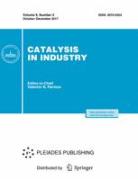Chimeric Polysaccharide of Monooxygenase with Attached Cellulose-Binding Module: Properties and Application for Hydrolysis of Cellulose-Containing Feedstock in the Composition of Cellulase Complex
https://doi.org/10.18412/1816-0387-2017-6-554-560
Abstract
Polysaccharide monooxygenases (PMO) was discovered several years ago in the composition of cellulase complexes to improve their saccharification capacity considerably. Methods of genetic engineering were used for creation of a chimeric PMO Thielavia terrestris based on enzyme with a cellulose-binding module (CBM) from cellobiohydrolase I Penicillium verruculosum attached through a peptide linker to the C-end. The chimeric PMO was more active (by 24 %) to amorphous cellulose and wider substrate specific than the initial PMO. With the attachedCBM, the chimeric PMO became capable of cleaving not only cellulose and β-glucane, but also xylane and CMC, while its activity to xyloglucane increased by an order of magnitude. In hydrolysis of MCC and aspen sawdust, when the chimeric PMO was substituted for 10 % of the highly active cellulase preparation hBGL2 produced by P. verruculosum at the retained total enzyme dosage with respect to the protein concentration, the yield of sugars increased by 24 and 47 %, respectively, the maximal sugar yield being reached in 24 hours of the reaction against 48 hours in the presence of the PMO-free preparation.
About the Authors
A. G. BulakhovRussian Federation
A. V. Gusakov
Russian Federation
A. M. Rozhkova
Russian Federation
P. V. Volkov
Russian Federation
V. Yu. Matys
Russian Federation
I. N. Zorov
Russian Federation
A. P. Sinitsyn
Russian Federation
References
1. Margeot A., Hahn-Hagerdal B., Edlund M., Slade R., Monot F. // Current Opinion in Biotechnology. 2009. Vol. 20. P. 372—380.
2. Merino S.T., Cherry J. // Advances in Biochemical Engineering/ Biotechnology. 2007. Vol. 108. P. 95—120.
3. Sims R.E.H., Mabee W., Saddler J.N., Taylor M. // Bioresource Technology. 2010. Vol. 101. P. 1570—1580.
4. Zifcakova. L., Baldrian P. // Fungal Ecology. 2012. Vol. 5. P. 481—489. 5. Kim I.J., Nam K.H., Yun E.J., Kim S., Youn H.J., Lee H.J., Choi I.G., Kim K.H. // Applied Microbiology and Biotechnology. 2015. Vol. 99. P. 8537—8547.
5. Proskurina O.V., Korotkova O.G., Rozhkova A.M., Kondrat'eva E.G., Matys V.Y., Zorov I.N., Koshelev A.V., Okunev O.N., Nemashkalov V.A., Bubnova T.V., Sinitsyn A.P. // Applied Biochemistry and Microbiology. 2015. Vol. 51. P. 666—673.
6. Булахов А.Г., Гусаков А.В., Чекушина А.В., Сатрутдинов А.Д., Кошелев А.В., Матыс В.Ю., Синицын А.П. // Биохимия. 2016. Т. 81. С. 530—537.
7. Phillips M.C., Beeson W.T., Cate J.H.D., Marletta M.A. // ACS Chemical Biology. 2011. Vol. 6. P. 1399—1406.
8. Levasseur A., Drula, E., Lombard, V., Coutinho P.M., Henrissat B. // Biotechnology for Biofuels. 2013. Vol. 6. No. 41. P. 1—14.
9. Quinlan R.J., Sweeney M.D., Leggio L.L., Otten H., Poulsen J.C., Johansen K.S., Krogh K.B., Jorgensen C.I., Tovborg M., Anthonsen A., Tryfona T., Walter C.P., Dupree P., Xu F., Davies G.J., Walton P.H. // Proceedings of the National Academy of Sciences USA. 2011. Vol. 108, P. 15079—15084.
10. Tanghe M., Danneels B., Camattari A., Glieder A., Vandenberghe I., Devreese B., Stals I., Desmet T. // Molecular Biotechnology. 2015. Vol. 57. P. 1010—1017.
11. Morozova V.V., Gusakov A.V., Andrianov R.M., Pravilnikov A.G., Osipov D.O., Sinitsyn A.P. // Journal of Biotechnology. 2010. Vol. 5. P. 871—880.
12. Crouch L.I., Labourel A., Walton P.H., Davies G.J., Gilbert H.J. // The Journal of Biological Chemistry. 2016. Vol. 291. No. 14, P. 7439—7449.
13. Пат. РФ 2378372. 10.01.2010; Бюл. № 1.
14. Dotsenko A.S., Gusakov A.V., Volkov P.V., Rozhkova A.M., Sinitsyn A.P. // Biotechnology and Bioengineering. 2016. Vol. 113. P. 283-291.
15. Aslanidis C., de Jong P.J. // Nucleic Acids Research. 1990. Vol. 18. P. 6069—6074.
16. Sanger F., Nicklen S., Chase A.R. // Proceedings of the National Academy of Sciences USA. 1977. Vol. 74. Р. 5463—5467.
17. Мерзлов Д.А., Зоров И.Н., Доценко Г.С., Денисенко Ю.А., Рожкова А.М., Сатрутдинов А.Д., Рубцова Е.А., Кондратьева Е.Г, Синицын А.П. // Биохимия. 2015. Т. 80, № 4. С. 556—567.
18. Aleksenko A., Makarova N., Nikolaev I., Clutterbuck A. // Current Genetics. 1995. Vol. 28. P. 474—478.
19. James P.E. Proteome Research: Mass Spectrometry. Berlin: Springer-Verlag. 2001. 274 p.
20. Bulakhov A.G., Volkov P.V., Rozhkova A.M., Gusakov A.V., Nemashkalov V.A., Satrutdinov A.D., Sinitsyn A.P. Using an inducible promoter of a gene encoding Penicillium verruculosum glucoamylase for production of enzyme preparations with enhanced cellulase performance // PLoS ONE. 2017. Vol. 12. No. 1. e0170404.
21. Синицын А.П., Черноглазов В.М., Гусаков А.В. Методы изучения и свойства целлюлолитических ферментов. Итоги науки и техники. Сер. Биотехнология. М.: ВИНИТИ, 1990. Т. 25. С. 30—37.
22. Frommhagen M., Sforza S., Westphal A.H., Visser J., Hinz S.W.A., Koetsier M.J., van Berkel W.J.H., Gruppen H., Kabel M.A. // Biotechnology for Biofuels. 2015. Vol. 8. No. 101. P. 1-12.
Review
For citations:
Bulakhov A.G., Gusakov A.V., Rozhkova A.M., Volkov P.V., Matys V.Yu., Zorov I.N., Sinitsyn A.P. Chimeric Polysaccharide of Monooxygenase with Attached Cellulose-Binding Module: Properties and Application for Hydrolysis of Cellulose-Containing Feedstock in the Composition of Cellulase Complex. Kataliz v promyshlennosti. 2017;17(6):554-560. (In Russ.) https://doi.org/10.18412/1816-0387-2017-6-554-560



























